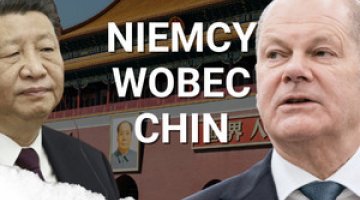Selling shares in the Hamburg terminal: Scholz does not want a clash with China
The ruling coalition in Germany, which has been struggling in recent months with the dilemma of how to combat the energy crisis while supporting Ukraine, now finds itself in another dispute. It concerns plans by the Chinese shipping company COSCO to buy a 35% stake in Hamburg’s container terminal (Container Terminal Tollerort GmbH, CTT). The company that manages the facility is owned by Hamburger Hafen und Logistik AG (HHLA), one of Germany’s largest shipping and transport companies, which is 69% owned by the Free and Hanseatic City of Hamburg. Its management is counting on the arrival of Chinese capital to boost the terminal’s competitiveness and improve its position on the market for trading cargo with the PRC.
According to German law, the sale of more than 25% of the shares, to buyers who would be non-EU entities, can only take place on condition that the federal government takes a unanimous decision not to oppose it. In this way, the German state has retained its control of industries and companies that are important to the country’s strategic interests. For example, this instrument was used twice in 2018: when the sales to Chinese investors of the Rhineland-based IMST communications company, and then the machine manufacturer Leifeld Metal Spinning from North Rhine-Westphalia, were blocked; and again this April, when Hayer Medical from Bad Ems, which produces respiratory aids, was prevented from making a similar move.
Support for blocking the HHLA-COSCO deal has mainly come from the Green Party, in particular the head of the ministry of economic affairs, Robert Habeck. He has been able to gather broad support on the issue from federal government ministers. The Chancellor’s Office, however, is of a different view, and has pushed for the sale of the shares to go ahead. There have been many indications that a stalemate would ensue, and that the decision to oppose the deal – which formally had to be reached by the end of October – would be postponed. In the end, however, a “compromise” within the government seems to be pushed through by Olaf Scholz: the deal will involve a minority stake of 24.9%, just below the threshold for the government to halt the sale.
Commentary
- According to the deal’s opponents, its implementation will translate into an expansion of the (already considerable) influence of Chinese capital in the sector of maritime transport and port infrastructure, which is of great strategic importance for Europe. COSCO is currently the fourth largest shipping operator in the world, and can attract sizable volumes of cargo to its port infrastructure. In Europe, this includes major terminals in Piraeus, Valencia, Bilbao, Zeebrugge, Antwerp, Rotterdam and Vado Ligure. According to DGAP (German Council for Foreign Relations), Chinese players already have stakes in 18 EU ports. COSCO’s potential is further strengthened by its membership of the Beijing-led SASAC group, which controls nearly 100 Chinese companies in the steel, mining, shipbuilding, communications, transport and other sectors. It is a network structure which, through mutual support, gives its members a significant advantage over their competitors, and increases their chances of expanding onto the EU market.
- COSCO is owned by the Chinese state, and will therefore pursue not only its own economic objectives but also the interests of the government in Beijing. The main question is how it will act in case of political conflicts with the EU and whether, in extreme cases, it will attempt to disrupt the operation of European terminals. This is not just a theoretical scenario, as evidenced by the experience of the sale of some of Bayernoil’s shares (in the Vohburg and Neustadt Donau refineries) to Russia’s Rosneft, which attempted to block certain decisions which were important to the company’s interests. The European Commission has highlighted the possibility of further risks; this spring it warned the German government that it could lose control over sensitive data concerning the transport of defence equipment through the port of Hamburg. Besides, China would never allow a similar deal on its own market: European companies are not allowed to offer any of their services there, even concerning inland waterway transport. The response to such discrimination should be symmetrical: no Chinese capital must be permitted to invest in terminals within the EU.
- However, German Chancellor Olaf Scholz’s advisers have claimed that these arguments were exaggerated. The sale of only a minority stake was expected to significantly reduce COSCO’s ability to take strategic decisions concerning the terminal’s operation, and the planned further reduction of the stake to 24.9% means that the investor will not even have a so-called blocking minority (this would be important, for example, if changes to the company’s articles of association were proposed). Concerns about how the operations of the port of Hamburg as a whole might change are also groundless. Although the Tollerort terminal is quite modern, it is also the smallest (only 4 berths and 14 gantry cranes); the Burchardkai terminal, the largest in the port of Hamburg, has 10 berths and 30 cranes. In the context of this justification, however, the argument raised by the deal’s proponents that rejecting COSCO’s offer would damage Hamburg’s competitive position with respect to other EU ports (in particular Rotterdam and Antwerp) – where Chinese investors are already involved and which benefit from handling cargo flows from the PRC – is questionable. Such a viewpoint invites speculation that the Chinese will only announce the actual scale of their expansion into transhipment infrastructure in Germany after the deal is concluded. Scholz may also be particularly keen to strengthen Hamburg’s position as he was mayor of the city from 2011 to 2018. It is also relevant that the Chancellor plans to visit China in early November: a quick compromise on the COSCO-HHLA deal will be a way of avoiding placing any strain on his talks with President Xi Jinping, which are already likely to be difficult.
- The dispute within the German government is being closely watched by its EU partners. For some of them, the issue of the sale of the Tollerort terminal may – as in the case of the recently announced ‘energy shield’ (see ‘Germany is fighting an energy war: €200 billion will be spent on dealing with high energy prices’) – be seen as another example of Germany’s inconsistency in its European policy. Berlin was in favour of Greece’s sale of the port of Piraeus to the COSCO conglomerate in 2016, which it saw as an opportunity to increase revenue to the Greek budget and accelerate the process of privatisation in this crisis-ridden economy. When relations with China deteriorated, then Germany became much more cautious about the expansion of Chinese companies in Europe. Croatia was one state which noticed this change of attitude in the EU, and it finally abandoned a deal for Chinese management of the terminal at Rijeka (see ‘Budowa nowego terminalu głębokowodnego w Rijece’). The pressure exerted by Chancellor Scholz to sell the shares in the Tollerort terminal gives the impression that the Germans are at least partially returning to purely economic arguments when assessing the inflow of Chinese investments: the competitiveness of German ports is now to be given priority. From the perspective of the EU’s partners, this represents a regression in relation to Berlin’s repeated declarations about having reached a ‘turning point’ (Zeitenwende) in its foreign & energy policy, and the consequent need to strengthen Europe’s strategic autonomy.
- In Germany itself, the issue of the HHLA-COSCO deal is one element of a difficult discussion about the future of Germany’s foreign policy and economic model. This discussion is in fact focused on the conclusions which must be drawn from the Russian attack on Ukraine and the growing conflict with dictatorships. The Greens and a majority of the FDP are inclined to reduce their economic dependence on China, and to gradually expand their cooperation with other regions of the world, especially democratic countries. The SPD and its leadership, on the other hand, have expressed more caution on this issue. The Social Democrats have lately been claiming more often that the German economy cannot afford an open conflict with the PRC, and that Germany should also maintain relatively correct political relations with those countries with which it does not share values regarding respect for human rights and democracy. These controversies are currently being discussed within the context of ongoing work on a new government document concerning a revised strategy towards China (see ‘A dangerous resemblance. Moves to revise Germany’s China policy’). The pressure to sell the shares in the Hamburg terminal which Scholz has been exerting will most likely increase the coalition partners’ caution, and extend the time it takes them to agree a position on this issue, which is a matter of crucial importance for Germany’s future.





